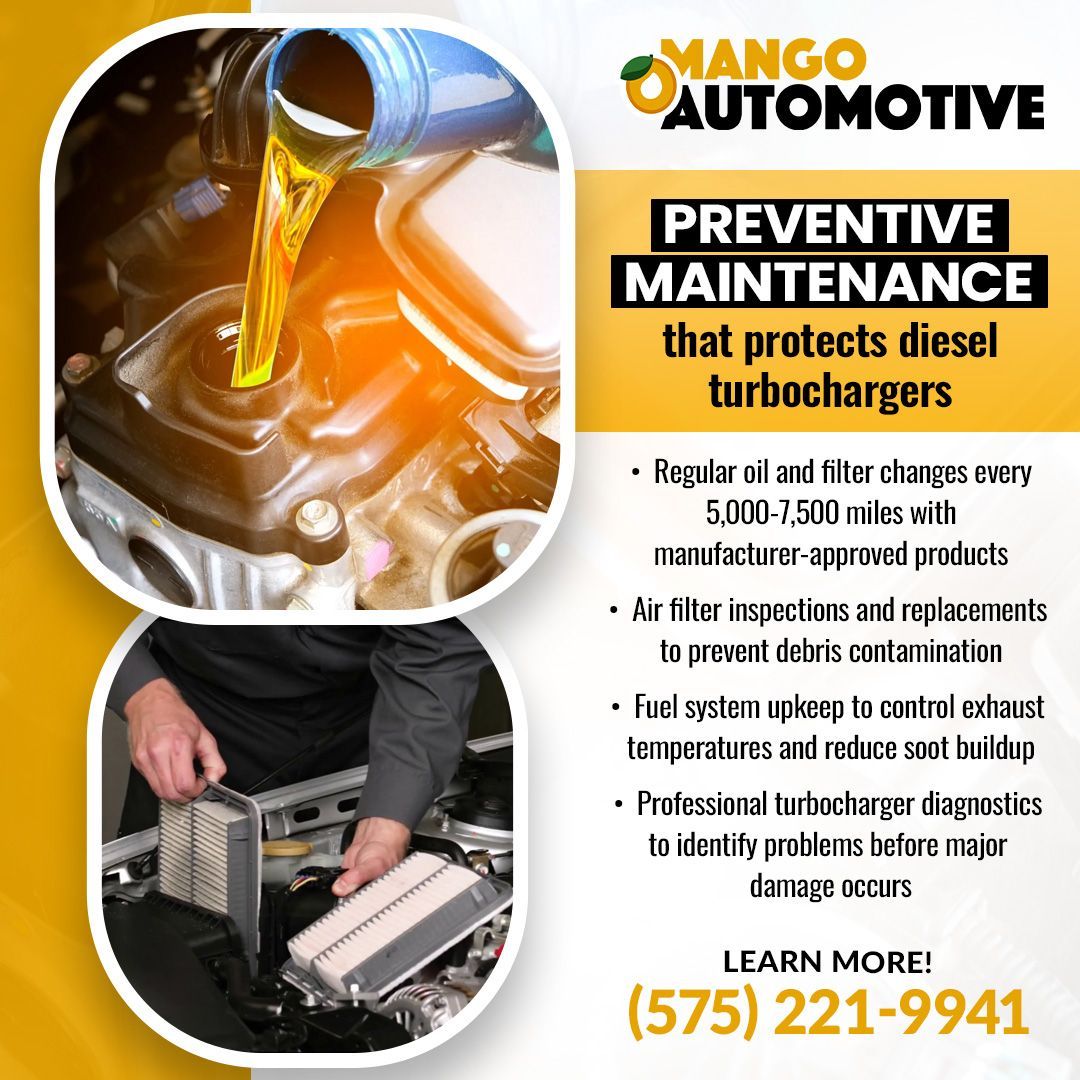Reduce Diesel Emissions: Tips From Las Cruces Diesel Mechanics
Diesel truck owners in Las Cruces face a unique combination of performance expectations, environmental regulations, and climate-related challenges. Between long hauls, worksite use, and daily driving in dry desert conditions, emissions systems are put under serious strain. Excess exhaust smoke, rough idling, and higher fuel usage are more than just performance problems. They can result in failed emissions inspections, unexpected downtime, and long-term engine damage. For drivers who rely on their diesel trucks for business or heavy-duty use, these issues directly affect operations and cost control.
Many owners aren’t aware that small mechanical problems, like faulty injectors or clogged filters, can cause emissions to rise well before warning lights appear. Others may struggle to find
diesel mechanics in Las Cruces who understand both the emissions systems and the driving demands specific to this region. At
Mango Automotive & Diesel, we speak directly to those concerns. Our goal is to help owners extend vehicle life, lower fuel consumption, and avoid unnecessary diesel repair costs through targeted service and emissions-focused maintenance.

What Causes Excess Diesel Emissions?
Excess diesel emissions come from poor combustion, mechanical failure, or unfavorable environmental conditions. Each of these issues contributes to increased particulate matter, unburned fuel, and nitrogen oxide levels. Addressing them early can lower repair costs and help trucks stay within emissions compliance.
Mechanical Issues That Lead to Poor Combustion
Mechanical problems interfere with the air-fuel mix and combustion efficiency. When fuel isn't burned completely, it results in thick smoke, higher emissions, and lower engine performance. These issues also stress other parts of the engine and lead to additional repairs if left unresolved.
Worn Injectors
Fuel injectors that are worn or leaking disrupt proper fuel delivery. This results in incomplete combustion and higher emissions of hydrocarbons and soot. For example, trucks with high mileage may show rough idling and black exhaust smoke caused by uneven fuel spray.
Drivers in Las Cruces who tow heavy loads or use their vehicles for commercial purposes often see faster wear on injectors. Replacing or cleaning injectors at regular service intervals can reduce emissions and improve fuel economy.
Air Intake Restrictions
Restricted airflow causes a rich fuel mixture and increases smoke output. Combustion becomes unbalanced when air filters or intake systems are blocked by debris or dust. This results in higher carbon monoxide levels and reduced power.
Southern New Mexico’s desert climate creates frequent exposure to fine dust. If drivers operate in construction zones or on rural roads, their air intake systems can clog quickly. Regular inspections and filter replacements by a
diesel mechanic near you are necessary to maintain emissions control.
Environmental Conditions That Affect Output
Ambient temperature and air quality directly affect diesel combustion and emissions. Engines respond to the surrounding air density, temperature, and oxygen levels. Drivers in Las Cruces experience two key challenges: high summer temperatures and cold winter starts.
Extreme Heat and Dust in Southern New Mexico
High temperatures and airborne dust reduce oxygen density and clog filters. When the intake air is hot and thin, engines burn fuel less efficiently. Dust can also build up in the air intake and emissions components, raising the risk of check engine lights and diesel particulate filter (DPF) clogging.
A diesel mechanic in Las Cruces may recommend more frequent air filter replacement during summer months. This reduces soot buildup and keeps the engine breathing clean air.
Cold Starts in Winter Months
Cold starts increase unburned fuel emissions due to low cylinder temperatures. Diesel fuel doesn’t atomize well in cold conditions, leading to white smoke and hard starts. Engines may run rich for longer periods until they warm up.
Even short winter periods can cause issues for diesel owners. Glow plug systems and block heaters are essential tools to reduce cold-start emissions during cooler months.
Key Warning Signs Your Truck Is Polluting Too Much
Trucks that pollute above normal levels often show visible, performance, or odor-related symptoms. These signs usually indicate poor combustion, clogged emissions parts, or mechanical failure. Catching the problem early can prevent costlier diesel repairs in Cruces and improve compliance with emissions rules.
Unusual Smoke Color
Black, white, or blue smoke means the fuel isn’t burning correctly. Each smoke color tells you something about the engine’s condition:
- Black smoke suggests too much fuel or not enough air. This can result from clogged air filters, worn injectors, or a faulty turbocharger.
White smoke often signals unburned fuel due to cold starts, low compression, or injector timing issues.
Blue smoke usually comes from oil burning in the combustion chamber. It is often caused by worn valve seals or piston rings.
Excess smoke is one of the most common complaints that diesel mechanics in Las Cruces hear from customers with aging trucks or poorly maintained fuel systems.
Noticeable Drop in Power or Fuel Efficiency
If your truck feels sluggish or refuels more often, emissions components could be failing. A restricted DPF, a failing EGR valve, or dirty injectors can reduce power and waste fuel. The U.S. Department of Energy reports that poor maintenance can lower fuel economy in vehicles, including diesel trucks.
Truck owners who haul loads or operate in high-heat conditions are more likely to face these issues. Regular
diesel repair can help keep performance steady and emissions output low.
Strong Exhaust Odor Around the Vehicle
A lingering fuel or chemical smell near the tailpipe signals unburned fuel or a faulty exhaust system. A strong diesel odor might point to a leaking injector, exhaust leak, or failed regeneration in the DPF system. Inhaling these fumes is harmful, especially in enclosed or congested areas.
Diesel mechanics often find that strong odors are ignored until other issues appear, like check engine lights or DPF failure. If your truck smells unusual while idling or accelerating, it’s time for a professional inspection.
Shop-Level Solutions From Diesel Mechanics in Las Cruces
Diesel repair shops in Las Cruces use inspection tools and repair methods that reduce emissions and restore performance. These services are designed to catch and correct problems that cause pollution, poor fuel use, or engine stress. At Mango Automotive & Diesel, our solutions are adjusted based on the truck’s age, usage, and emission control system.
Advanced Smoke Testing
Smoke tests can locate combustion problems that lead to excess pollutants. At our diesel repair shop, we use this method to check smoke density and detect intake or exhaust leaks. Dense smoke often signals injector problems, dirty filters, or low-grade fuel.
This testing also helps our diesel mechanics find the source of leaks quickly, without taking the engine apart unnecessarily. If your vehicle fails a smoke test, it likely needs immediate attention to stay compliant with emissions standards or pass inspection.
Custom Tune-Ups for Emissions Balance
A tune-up can fix performance loss and reduce smoke by correcting timing, fuel mix, and air delivery. Sensors and electronic control units (ECUs) in modern diesel engines manage emissions. These settings can be reset or adjusted by a diesel mechanic near you using factory-grade tools to get emissions back in range.
For trucks that run in southern New Mexico’s heat and dust, tune-ups may also include cleaning the mass airflow sensor, replacing air filters, or reprogramming injection timing. These steps ensure both fuel efficiency and lower emissions.
Exhaust System Repairs
Leaks, cracks, or failed components in the exhaust system often cause higher emissions and poor engine performance. Common problem areas include the diesel particulate filter (DPF), exhaust gas recirculation (EGR) valve, and catalytic converter. A damaged DPF can cause smoke and high backpressure, while a failed EGR valve may raise NOx emissions.
Our diesel repair shop in Las Cruces often services trucks that suffer from these issues due to towing, hill climbs, or short-trip driving that interrupts proper DPF regeneration. Replacing or cleaning these components can improve both emissions output and reliability.
Hidden Benefits of Reducing Diesel Emissions
Reducing diesel emissions protects the engine and lowers operating costs over time. Trucks that run cleaner tend to last longer, use less fuel, and need fewer unexpected diesel repairs.
Reduced Wear on Internal Engine Parts
Cleaner combustion prevents carbon buildup that damages pistons, valves, and turbochargers. When diesel burns unevenly, it leaves behind soot and acids that wear down metal parts. This can lead to compression loss, injector fouling, and turbo failure.
Keeping emissions in check also helps the EGR system work properly. A healthy EGR reduces combustion temperatures, lowering stress on the engine block and cylinder head.
Lower Fuel Consumption Over Time
Diesel engines with low emissions burn fuel more efficiently. Fuel economy drops when components like the mass airflow sensor, turbocharger, or fuel injectors are affected by soot or clogging. A clean-burning engine avoids these issues and runs closer to its original factory specs. For trucks driven daily in Las Cruces, even small efficiency gains can add up to hundreds of dollars in fuel savings each year.
Fewer Trips to the Shop for Costly Repairs
Emissions-related problems often lead to more serious and expensive damage if ignored. Blocked DPFs, worn injectors, and failed EGR valves can trigger warning lights, limp mode, or breakdowns. These repairs are common causes of downtime and towing expenses for diesel owners.
By controlling emissions early, these types of diesel repairs in Cruces can be prevented. Scheduled maintenance, tune-ups, and exhaust inspections all play a role in keeping trucks running without interruption.
Daily Habits That Keep Your Truck Running Cleaner
Simple daily routines can reduce emissions and improve diesel engine health. Drivers in Las Cruces who haul equipment, drive in dusty areas, or idle at job sites can reduce pollution by adjusting how they operate their vehicles each day.
Warming Up Properly Before Driving
Cold starts produce more emissions and increase engine wear. Letting the engine warm up for 3–5 minutes before driving allows oil to circulate and combustion temperatures to stabilize. This is especially important in cooler months, when incomplete combustion can lead to unburned fuel and extra soot.
For trucks with DPFs, short trips without warm-up can lead to filter clogging. Over time, this raises exhaust backpressure and can trigger warning lights or force a manual regeneration.
Managing Idle Time at Job Sites
Long idling increases emissions and wastes fuel. According to the U.S. Department of Energy, a truck can burn up to 0.8 gallons of fuel per hour while idling. This adds unnecessary wear and extra pollutants to the environment.
Using idle-reduction practices, such as turning the engine off during long waits or using auxiliary power units, can reduce emissions, especially during summer months in Las Cruces when air conditioning puts added strain on the system.
Monitoring Load Weight and Towing Practices
Excessive weight forces the engine to work harder, leading to more emissions. Overloaded trucks produce more soot, especially when climbing hills or accelerating frequently. Sticking to recommended towing capacities and distributing weight evenly across axles helps maintain steady combustion and reduces soot output.
For diesel owners who tow trailers or carry heavy equipment, maintaining proper tire pressure and using tow/haul modes can further reduce emissions by optimizing engine output.
Emissions Failures and What to Do Next
A failed emissions test usually means your diesel truck is releasing too many pollutants. In New Mexico, commercial diesel vehicles are required to meet specific emissions standards. If your truck doesn’t pass, it may be due to problems with fuel delivery, exhaust filtering, or sensor function.
Steps to Take After a Failed Test
Start with a diagnostic inspection by a qualified diesel mechanic. A professional diesel repair shop can scan your truck’s onboard computer for trouble codes, check exhaust readings, and inspect components like the EGR valve, injectors, or DPF. These are common sources of excess soot or NOx emissions.
Avoid quick fixes like fuel additives without a proper inspection. These may temporarily mask symptoms but won’t address the real issue, especially if sensors, filters, or combustion timing are out of range.
Services Available From Our Diesel Repair Team in Las Cruces
Mango Automotive & Diesel in Las Cruces offers full repair and re-testing support. Our diesel mechanics in Las Cruces are equipped to handle both routine and complex emission issues. Services include:
Smoke opacity testing to measure particulate levels.- DPF and EGR service to clean or replace clogged components.
- Sensor and ECU checks to recalibrate emissions systems.
- Custom tune-ups to balance fuel-air ratios for cleaner output.
We offer regular maintenance services, which help you avoid future test failures and keep your vehicle compliant year-round.
The Role of the Driver in Reducing Emissions
Drivers play a direct role in keeping diesel emissions under control. Even with well-designed engines and emission systems, driver habits and maintenance decisions affect long-term output. Skipping service or using uncertified parts can cause systems to fail and emissions to rise.
Keeping Up With Service Schedules
Regular service helps maintain clean engine operation. Ignoring service intervals, especially for oil changes, air filters, and fuel system maintenance, leads to poor combustion and excess soot.
For example, a clogged air filter can lower airflow and cause higher particulate emissions. Routine replacement avoids this and supports efficient fuel burn. At Mango Automotive & Diesel in Las Cruces, we provide service scheduling support for both individual and fleet customers to stay ahead of these problems.
Choosing Certified Technicians for Work on Emissions Equipment
Certified diesel mechanics are trained to work with complex emissions systems. EGR valves, DPFs, and SCR (Selective Catalytic Reduction) units in modern diesel engines require specific tools and training. An unqualified repair job could damage the system or result in a failed emissions test.
Our
diesel mechanic team in Las Cruces uses the proper diagnostic tools and OEM-spec parts to keep your vehicle compliant. We specialize in emissions repairs and inspections for work trucks, heavy-duty vehicles, and diesel pickups.
By choosing a qualified mechanic near you and following a consistent service routine, drivers can directly lower emissions, improve fuel economy, and avoid fines or downtime.
Why Diesel Owners in Las Cruces Choose Mango Automotive & Diesel
Repairs Backed by Local Experience
Mango Automotive & Diesel is staffed by technicians who know the repair needs specific to diesel trucks in the region. Our diesel mechanics in Las Cruces work on vehicles that operate in high-heat, dusty, and towing-heavy environments. These conditions can lead to injector wear, clogged filters, and faster breakdown of emissions components.
Local knowledge helps us identify common problems faster and reduce the time your truck spends in the shop. This is important for work vehicles that can’t afford long downtimes. We also specialize in both light-duty and heavy-duty diesel repairs in Cruces. Whether you're driving a personal pickup or managing a commercial fleet, our shop can handle engine, emissions, and exhaust system issues.
Transparent Communication
We explain each repair clearly and let customers approve work with a full understanding of what’s involved. A trusted diesel mechanic near you should offer clear answers, not leave you guessing. Our mechanics explain the cause of problems in plain terms. We also give repair options based on safety, emissions needs, and cost. That includes photos of affected parts and written breakdowns of labor and materials.
This level of communication prevents surprises. It also builds trust with diesel owners who rely on their trucks every day for work, travel, or towing. We don’t recommend diesel repairs in Cruces that you don’t need, and we document each step.

Book Diesel Emissions Service in Las Cruces With the Experts
Reducing diesel emissions starts with the right repair team and routine maintenance. Whether you operate a personal truck or manage a fleet in Las Cruces, staying on top of emissions issues protects your engine, lowers fuel costs, and keeps you compliant with New Mexico’s standards.
Mango Automotive & Diesel offers full-service diesel repair in Cruces and preventive care tailored to the region’s driving conditions. Our certified diesel mechanic team works on all major truck and diesel systems, including DPFs, EGRs, and exhaust repairs.
Schedule your diesel emissions service today with Mango Automotive & Diesel. Call our Las Cruces shop at
(575) 221-9941
to speak with a certified diesel mechanic and get your truck running cleaner and more efficiently.














